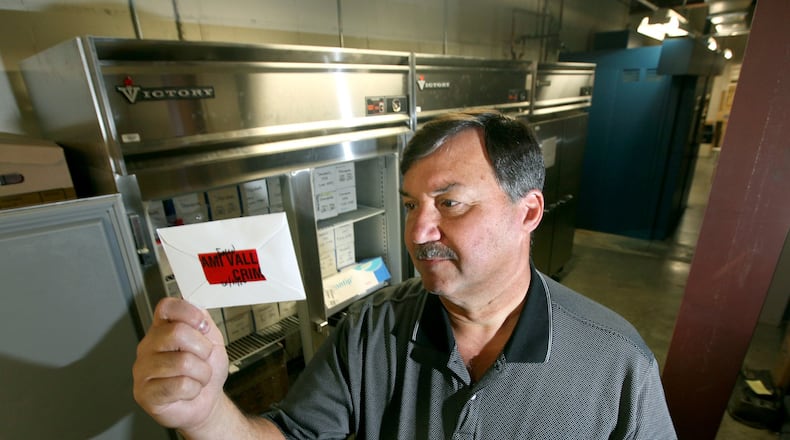During his 46-year career, Betz witnessed some of the region’s worst catastrophes and analyzed evidence in its most compelling criminal cases.
“I don’t want to ever call anything routine, because it’s not,” he said. “I think what brings people to work every day is there is a new challenge, a new case every single morning at the coroner’s office and at the crime laboratory where your job is to try and determine cause and manner of death.”
Here are five cases he singled out from his career:
1974 | Xenia Tornado
Just as his career was starting, a massive tornado swept through Xenia and Betz was called out to help with the deceased. The twister bulldozed a path a half-mile wide. When it was over, 33 people were dead and more than 1,300 were injured.
“We set up morgue at the time and improvised,” he said.
Events like the tornado and others throughout his career, including the 9/11 terrorist attacks, led to the eventual buildup of a portable morgue based in Montgomery County and the training of staff capable of handling scores of mass casualties.
“If something happened in our community, we are prepared to go out in the field and handle any kind of disaster that might be there,” he said. “Most folks may not be aware the Montgomery County Coroner’s office has taken the lead.”
1990 | Deadly I-75 pileup
In February of 1990, whiteout conditions at Tipp City produced a massive pileup that killed 9 people and injured 40. As many as 40 vehicles, including tractor trailers, lost control on the icy highway.
Betz was called to the scene shortly after it happened.
Reports at the time said emergency workers were tearing the remains of cars apart with their bare hands to remove charred bodies from cars gutted by fire and crushed like accordions.
Betz said many of the dead were Canadians and they had to work through international authorities to help identify the bodies.
Several cars involved in the accident were pinned under the tractor-trailers.
He recalls the Miami County Coroner saying, “Ken you’re here. Can you work with the state patrol and handle the dead?”
“There was a semi loaded with Dole pineapple juice and it caught on fire and we walked through this sticky scene,” he said. “What a tragedy when you interviewed people and you had live folks trapped.”
2005 | Death of baby in microwave
China Arnold had trials in February 2008, September 2008 and May 2011, and ultimately was sentenced to life in prison after being convicted of murdering her 28-day-old daughter Paris Talley by placing her in a microwave and “cooking” her in August 2005.
Betz said the case hinged on science and technology.
Credit: Chris Stewart
Credit: Chris Stewart
Credit: Chris Stewart
Credit: Chris Stewart
“That was a case that went on and on for a while.” He said. “The very fact you can find DNA in a microwave and use science helped establish the facts of a case.”
Claudena Helton, who is accused of killing two of her children with gunshots to the head in May, could be the first woman to face a death penalty case trial in the county since Arnold.
2008 | Bathtub murder
After Ryan Widmer was convicted of killing his wife Sarah in a bathtub at their home in Warren County, questions have persisted through appeals whether investigators handled evidence correctly.
The regional lab had analyzed the bathtub, DNA, fingerprints and other evidence in the sensational Warren County case in which Widmer, remains in prison,
The first verdict in this case in April 2009, delivered after 23 hours of deliberations, was guilty.
The crux of the case was when first responders arrived minutes after Widmer dialed 911, the bathroom and Sarah’s body were virtually dry and only her blonde hair was damp. Prosecutors claimed Widmer drowned his wife of four months and then staged his 911 call.
Betz said it was another case that relied on a great deal of science to unpack the evidence: “Was the hair wet, was it not? Did we take the fingerprints off the bathtub? Did we remove the bathtub?”
The first verdict in 2009 was tossed out after it was revealed several jurors performed at-home drying experiments and shared their findings with fellow jurors.
Widmer remains behind bars on a 15-years to life sentence. His first parole board hearing is scheduled for July 2025.
About the Author







